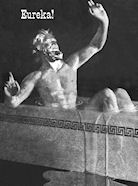Holy Diver
You've been down too long in the midnight sea
Oh what's becoming of me - DIO
Hill Taylor stunned the world by breaking the world-record in backstroke 50 m in a minor championship. His performance was also a baptism, in which the name dolphin-man was lent to him.
Dolphin-man is the fastest in the contest, and, with regards to the distance backstroke 50 m, even in the world. But he cannot win, and he knows that. It all depends on his maneuvre of preference, the dolphin-kick. The excellence by which he wields this powerful weapon is the key to his total domination. This move is not essentially illegitimate in backstroke, only so when it emerges in certain proportions. A swimmer must return to air after fifteen metres, lest he's to be disqualified.
Consequently, backstroke 50 m should be named "backstroke more than or equal to 35 to less than or equal to 50 m". Given this, one cannot practically be a record-holder in backstroke 50 m! If you on the one-hand swim using regular backstrokes (think paddle-wheels on steamboats), your opponents will leave you behind as fast as dolphins ward off a shark attack. On the other hand, if you, like the dolphin-man, multiplicate the efficient dolphin-kick, your result is not qualified. That he aggregates a legitimate gesture at least qualifies him as minor athlete.
Practically, no one can be said to hold the world-record in this aquatic event, since what's measured is fuzzy. A fuzziness whose depth dolphin-man delves into. Almost like what D&G hold as the ideal stance in minor science, it is both the "backstrokeness" and "50 metresness" of backstroke 50 m that dolphin-man examines in this race. Albeit in a bigger bathtub, and with an euresqueeeeka, dolphin-man's performance appears as an Archimedean event.


The dolphin-man proves to be a fine specimen of the variety of conceptual athletes, by way of which the poet John Keats demonstrates the essence of poetry for his adept-lover Fanny Brawne in the movie Bright Star:
Reading the work of Peter Sloterdijk incites us to ask strange questions. For example, can man become an aquatic being again? Is it possible for a human being to dive into the water not to drown there but to take up with dolphins and mermaids? Are we able to switch elements like this? (...) Sloterdijk's focus on the elements air and water is meant to counteract the age-old philosophical tendency to prioritise earth and fire. (...) It is true, philosophy started with a notorious claim about water. Thales of Miletus (624-545 BC) argued that it was no less than the basic principle (arche) of everything, but subsequent philosophers have done everything to stash away Thales's proposition. How, after all, could one base the world on something fluid? So, philosophy forgot about its own beginnings and became a dry exercise. (...) Almost all anthropology is suffering from a mono-elementary bias. It interprets us as creatures who in the end can only exist in one element, that is to say, on the mainland, in the so-called real. - Rene ten Bos, Towards an amphibious antropology, Environment and Planning D: Society and Space 2009, volume 27, pages 73-86.
A poem needs understanding through the senses. The point of diving in a lake is not immediately to swim to the shore; it's to be in the lake, to luxuriate in the sensation of water. You do not work the lake out. It is an experience beyond thought. Poetry soothes and emboldens the soul to accept mystery.Poetry (poeisis) is equivalent with pro-duction (Agamben), invention (Serres), and virtuosity (Virno). Poeisis just happens and is seldom an effect of a planned scheme; contrary to praxis, which contains in itself the goal, the implementation, and the expected outcome of an act. But doesn't dolphin-man, contrary to Keats' poet-swimmer, immediately swim to the other shore? Isn't dolphin-man rather an example of a teleological thinking devoid of all means and process? No. He demonstrates that speed is of the essence, not in order to win, but in order to be able to discern problems just before they gel. To gel is the same as being devoured by that great monstrosity that strives to capture all lines of flight: spectacle. Investigate into fuzziness instead! Dolphin-man will lead us past Leviathan.
During movement, the dolphin-man never leaves the water, which is treason against "the criterion of due humanness in sport".* It's mandatory that the body backstroke-swimmer breaks the surface at least once from underneath. In backstroke man must proof he's a mono-elemental entity by breathing once in a while. Dolphin-man doesn't. Beneath waves events are too furtive to be (made) spectacular.
*This concept will need more unfolding than the initial one, carried out here. "The criterion of due humanness in sport" is a concept that relies on the hypothesis that sport, in order to be sport, must include Latourian-flavoured "trials of humanness". The human factor must be guaranteed and legitimized in sports. When someone runs fast in track and field contests, wind speed must be accounted for in order for the results to be reliable. Testing for doping is legio in contemporary sports. That illegal substances mustn't be found in the athletic body is another example of the criterion of due humanness in sport.
On the one hand, sport is a perfect inversion of the laboratory in which humanness must be quashed, and in which substances are everything. On the other hand, sport is only partly a perfect inversion of the laboratory (at least in Latour's ideal-type of the same): whereas objective measure is celebrated in both laboratories and sports, the former purify nonhumanity from humanness, while the latter purify humanity from nonhumanness.

